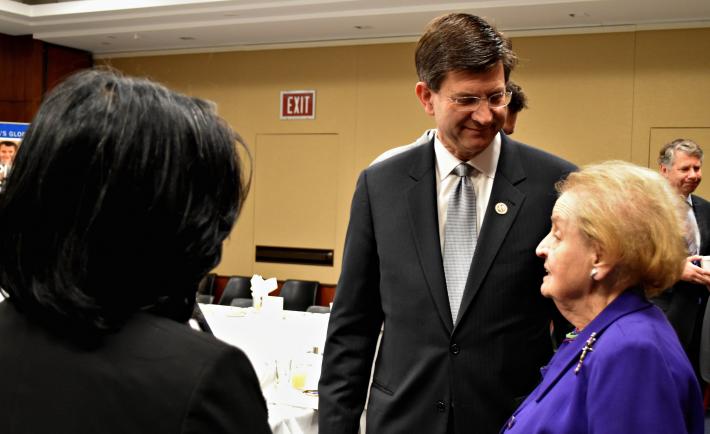
NDI Chairman Madeleine Albright discusses democracy assistance with Representative Brad Schneider (IL-10) and freshman Representative Pramila Jayapal (WA-07)
I’ve seen my share of campaign slogans, and—to my knowledge—democracy assistance has yet to make it to the political mailers. In fact, foreign policy is rarely a key campaign issue for Congressional candidates, who tend to talk about fixing problems at home rather than facing challenges abroad. Yet, when they come to Washington, Members of Congress become essential decision-makers in the foreign policy process that determines America’s place in the world.
No matter how well-informed a new Representative or Senator is on international affairs, democracy assistance—the kind of work that NDI does every day in 60 countries around the world—is something of a niche topic. And since Congress plays such a central role in the funding we receive, it is more important than ever for NDI, and organizations like ours, to make sure that our elected officials understand the value of our work, not just to our partners abroad, but to our fellow citizens here at home.
Democracy assistance is a cost-effective way to promote American interests abroad. If foreign countries fail politically, all other development goals fail, including trade, health, and education. Unaccountable governments give rise to corruption and the squandering of assistance dollars. In this interconnected world, what happens inside countries transcends borders and regions, especially when it comes to terrorism, disease, and the flow of refugees.
NDI’s work helps stabilize emerging democracies, making them resilient to extremist groups, by investing youth and women in their country’s future. Democracy assistance helps avoid military conflict and refugee crises, because if people feel connected politically, economically and socially to their own country and have opportunities to thrive there, they are less likely to turn to violence or to migrate. It builds up strong institutions, which create a business climate conducive to U.S. exports, and it promotes the core American value of democracy.
With this in mind, last week NDI held a breakfast for freshman legislators to discuss U.S. international leadership and democracy assistance. Entitled “Confronting Today’s Foreign Policy Challenges,” the discussion featured NDI Chairman Madeleine Albright, who shared her personal journey to become the first woman Secretary of State, and the urgent need for continued U.S. engagement. The discussion resulted in a lively conversation with the new Members of Congress. There was uniform agreement on the need for a robust foreign assistance budget and vibrant international leadership by the U.S.
Congressman Brad Schneider (IL-10) greeted his new colleagues and offered opening remarks. Reflecting on what he called an “important briefing,” Rep. Schneider added, “As our investment in diplomacy and aid is increasingly under threat, the conversation was a timely reminder of the importance of US engagement in international affairs and the value of the irreplaceable work being done by our dedicated diplomats across the globe.” Freshman Members of Congress Stephanie Murphy (FL-07), Pramila Jayapal (WA-07), and Dwight Evans (PA-02) joined the discussion.
It is clear that the new members have a keen understanding of the interconnectivity between foreign affairs and the domestic issues they came to Congress to tackle.
For example, food security is the issue most dear to Dwight Evans from my hometown of Philadelphia, whether it occurs on North Broad or in North Africa. “The stability of our food sources is crucial to the foundation of a strong democracy,” he said. “No matter the situation—times of peace, times of war—in order to provide safety and security we must always have a food source. Our Farm Policy not only informs our Foreign Policy, but truly is our Foreign Policy.”
Since the 115th Congress was sworn in on January 3, NDI has been having educational conversations with new and seasoned lawmakers alike. We make sure they understand how a youth program in Amman keeps families safe in Atlanta, how anti-corruption initiatives in Tegucigalpa safeguard the border in Texas, and most of all, how a small investment in democracy support around the world today will allow the citizens of the United States to live a freer, more prosperous existence for years to come.
